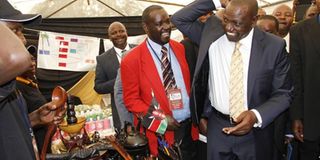Deputy President William Ruto proposes plans to boost jua kali

Deputy President William Ruto (right) admires various products during the National Jua Kali Devolution conference held at Bomas of Kenya, Nairobi on August 29, 2014. PHOTO | DPPS
What you need to know:
- The industry produces about 80 per cent of jobs and accounts for 40 per cent of the country’s Gross Domestic Product, Mr Ruto said.
- Mr Ruto called for a paradigm shift in the perception of the business.
Tough new measures may be put in place to discourage import of products that can be made in the country.
Massive importation of such products had hurt the jua kali products in Kenya, Deputy President William Ruto said on Friday.
Mr Ruto was speaking when he opened the first national jua kali devolution conference at the Bomas of Kenya, Nairobi.
The industry produces about 80 per cent of jobs and accounts for 40 per cent of the country’s Gross Domestic Product, Mr Ruto said noting that the business is capable of satisfying the local market.
He gave an example of furniture noting the President and himself were using furniture that was made locally in their offices.
This demonstrated that the country had a robust industry that can produce high quality furniture yet Kenyans were using millions of shillings importing them.
“We may raise duty on some imported goods that can be made locally to create more market for Jua kali products and other goods made locally.”
PARADIGM SHIFT
Mr Ruto called for a paradigm shift in the perception of the business. He noted that the sector drives the wheels of the Kenyan economy and added that it had suffered a poor perception that it was meant for academic failures.
“Even the name jua kali should be changed and the training of artisans, technicians, and technologists must be directed towards improving their skills to perform better,” he added.
In this regard, Mr Ruto called for a change of curriculum in the Technical Vocational Educational Training Institutes and in the village polytechnics to train artisans.
Parliament has passed two Bills creating a separate authority to administer examinations in technical institutes.



